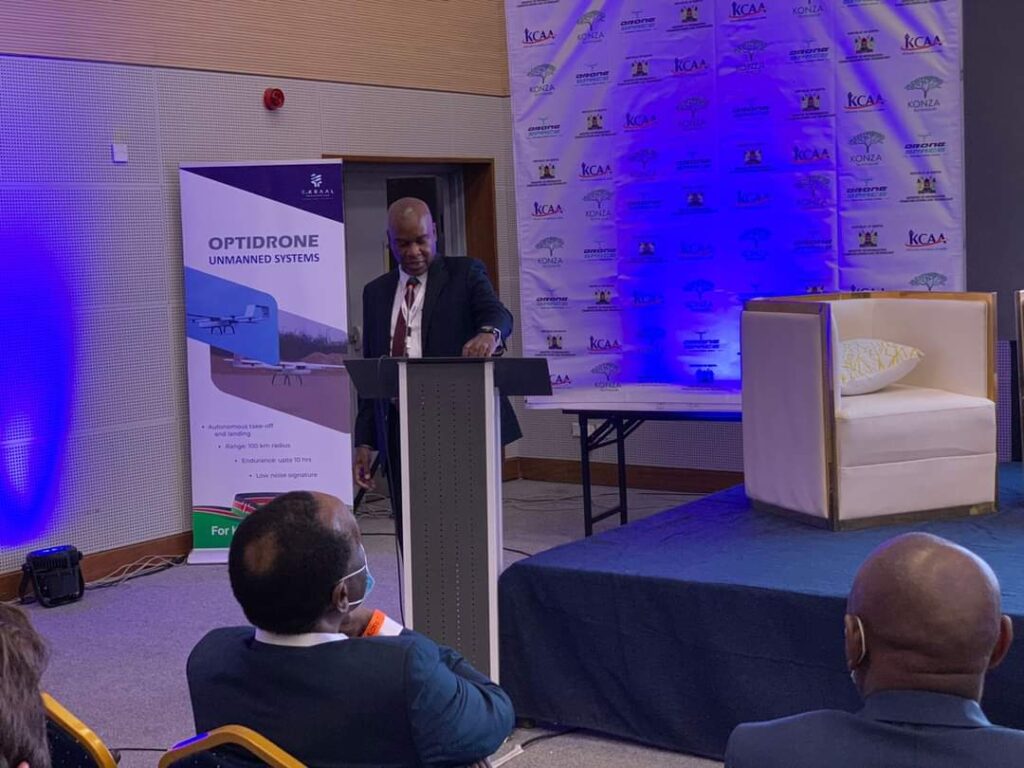KCAA Says Drone Regulations To Make Skies Safe

By John Kariuki
Drones regulations aim at making operations of the unmanned aircraft systems safe and secure.
Speaking during the Drone expo at Sarit Centre, Kenya Civil Aviation Authority Director General, Emile Nguza Arao, said that the Authority and stakeholders had developed the regulations to ensure the sky remained safe.
The Director General was addressing a concern from operators that clearance for operations takes long and hence slowing down the fast growing tech space.
In the sidelines of Drone Expo at Sarit Centre, The Times Online sought audience with the Director General Kenya Civil Aviation Authority, Emile Nguza Arao. This is what he had to say:
“We are Cognizant of the concerns raised by the operators in regards to the clearance for one to be given a clean bill of health to proceed with drone operations in the country. However, we have to be alive to the fact that our airspace remains our greatest single asset as far as the aviation field is concerned. That means proper checks and balances have to be buttressed.”
If not well operated, said the DG, drones have the potential to cause harm. Mr. Arao cited some of the possible dangers that drones can cause, if not well regulated. “Consider a case of a drone colliding with an aircraft, that would mean huge loses to life and property. A standard aircraft goes for anywhere between 45 and 50 Million USD. Should a wayward drone collide with such an aircraft, it can easily cause havoc.”
He said the perennial threat of terrorism is a national concern that must be well checked. “That means we must be hawk-eyed before we release the licenses to the operators, and these regulations are not punitive but are intended to keep the airspace safe”.
Indeed, Kenya Civil Aviation Authority (KCAA) with the support of a dedicated Multi-Agency Team has developed the Kenya Civil Aviation (Unmanned Aircraft Systems) Regulations, 2020 and attendant procedures that guide the importation, acquisition, registration and safe operation of UAS in our airspace. This has opened pathways towards fully integrating UAS into the nation’s airspace. These Regulations work to harness innovations safely, spur job growth, advance critical scientific research and save lives.
These are the General Rules for Flying a Drone in Kenya
- A Kenyan citizen or resident must be at least 18 years old in order to own and operate a drone (Applicants should have a company registered in Kenya).
- Importing or exporting drones is only allowed with the approval of the KCAA.
- A person shall not transfer ownership of a drone without the approval of the KCAA.
- Operators must register their drone with the Authority and be issued with a certificate of registration.
- All drone operations must be conducted under a specific operational category based on risk factors.
- Commercial drone operations require a pilot to obtain a Remote Aircraft Operators Certificate (ROC) from the Authority.
- Drones shall not fly above 400 feet AGL or within 164 feet (50 meters) of any person, vessel, or vehicle that is not a part of the operation.
- A pilot shall not fly a drone in non-Visual Meteorological Conditions or at night unless authorized by the Authority.
- No person shall operate an Unmanned Aircraft System over a public road or along the public road of at a distance of less than 164 feet (50 meters).
- A public roadway shall not be used as a place of landing or take-off of a drone.
- Operating a drone within 6.2 miles (10 kilometres) of an airport from the airport reference point for code C, D, E, and F airports is prohibited without authorization
- Operating a drone within 4.3 miles (7 kilometres) of an airport from the airport reference point for code A and B airports is prohibited without authorization.




